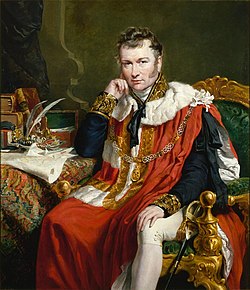Charles Stuart, 1st Baron Stuart de Rothesay
|
The Right Honourable The Lord Stuart de Rothesay GCB PC |
|
|---|---|
 |
|
| British Ambassador to Russia | |
|
In office 1841–1844 |
|
| Preceded by | The Marquess of Clanricarde |
| Succeeded by | Hon. John Bloomfield |
| British Ambassador to France | |
|
In office 1828–1830 |
|
| Preceded by | The Viscount Granville |
| Succeeded by | The Viscount Granville |
| British Ambassador to France | |
|
In office 1815–1824 |
|
| Preceded by | The Duke of Wellington |
| Succeeded by | The Viscount Granville |
| Personal details | |
| Born | 2 January 1779 |
| Died | 6 November 1845 (aged 66) Highcliffe Castle, Dorset, England |
| Nationality | British |
| Spouse(s) | Lady Elizabeth Margaret Yorke |
| Relations |
Sir Charles Crichton-Stuart )father) John Stuart, 3rd Earl of Bute (grandfather) |
| Alma mater | Christ Church, Oxford |
| Occupation | Diplomat |
| Religion | Church of England |
Charles Stuart, 1st Baron Stuart de Rothesay GCB PC (2 January 1779 – 6 November 1845), known as Sir Charles Stuart between 1812 and 1828, was a British diplomat. He was twice Ambassador to France and also served as Ambassador to Russia between 1841 and 1844.
Stuart was the son of Lieutenant-General the Honourable Sir Charles Crichton-Stuart, younger son of Prime Minister John Stuart, 3rd Earl of Bute. His mother was Louisa, daughter of Lord Vere Bertie, younger son of Robert Bertie, 1st Duke of Ancaster and Kesteven. He was educated at Eton and Christ Church, Oxford.
Stuart joined the Diplomatic Service in 1801,and was immediately appointed as Secretary of Legation in Vienna, a post he held until 1804. He was then sent to Petersburg and this was followed by an assignment in French occupied Spain in 1808. He served as Envoy Extraordinary and Minister Plenipotentiary to Portugal and Brazil between 1810 and 1814.
Briefly Ambassador to the Netherlands between February and May 1815, it was during his posting as ambassador in Spain that he became indispensable to the Duke of Wellington. At the Generals' insistence, he was appointed British Ambassador to France. During Napoleon's Hundred Days, he left Paris and was in Brussels at the start of the Waterloo Campaign, where during his stay he attended the Duchess of Richmond's Ball. After the fall of Napoleon, he escorted the exiled French King Louis XVIII back to Paris, and became British Ambassador there until 1824.
...
Wikipedia
